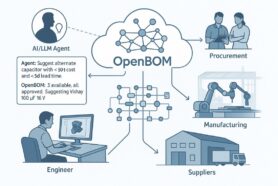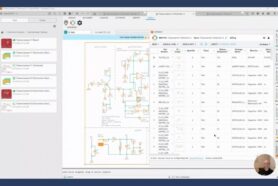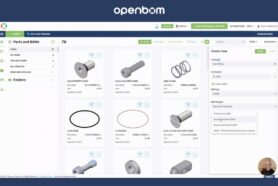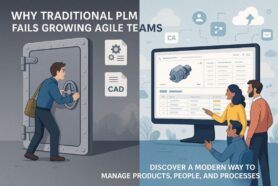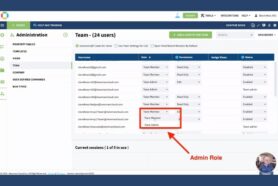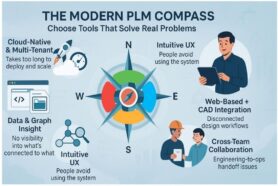
In the fast-evolving landscape of technology, data has emerged as the lifeblood of modern businesses. To thrive in this data-centric environment, engineers must equip themselves with the right skills and tools to effectively manage and leverage data assets.
15-20 years ago the typical data management playbook of any engineering organization looks like the following diagram:
Fast forward to the 21st century, we’ve learned that data cannot be dropped in folders/files or stored in Excels. That will make it dead data and will put your organization at a significant disadvantage compared to other players in the market.
I remember back in1990s working with simple databases, local data files, and transforming data coming from desktop applications to a central database. That was the top of engineering data management desire.
Things are changing these days and data management technologies are transforming fundamentally from thinking about how to manage files, folders, and tables to how data can be organized, transformed, and processed in the organization to create benefits for people who understand how to use data in the 21st century.
In this blog post, I’d like to explore five crucial data management skills for engineers in 2024 and present a comprehensive Engineering Data Playbook to guide your journey toward digital data transformation.
Data Modeling Basics:
It all starts with understanding data. Even if you think about your beloved Excel, data in this Excel represents important functions and it creates a structure and relationships. SQL is not everything like it was 20 years ago. You need to understand data models. Understanding data modeling basics is fundamental for engineers to comprehend different data types, relationships, and data organizations. By mastering data modeling concepts, engineers can design efficient databases and make informed decisions regarding data storage and retrieval.
Cloud Storage and Cloud Data Management:
In today’s interconnected world, engineers must grasp cloud storage and cloud data management principles. Familiarity with various cloud platforms enables engineers to leverage scalable and cost-effective solutions for storing and accessing data, paving the way for enhanced flexibility and efficiency in data management processes. Modern hypescalers such as AWS, Azure, GCP, and others give you a powerful way to store the data in the cloud.
REST API and Programming Online Services:
Proficiency in REST API and programming online services is indispensable for engineers to connect disparate data sources and streamline information flow. By harnessing the power of APIs, engineers can integrate diverse data streams, automate workflows, and extract valuable insights from data-rich environments. The world is a combination of apps and data services interconnected to build meaningful relationships between tools.
Integration of Generative AI Tools:
Integrating generative AI tools into workflows empowers engineers to unlock new possibilities in data analysis and decision-making. From predictive modeling to automated feature generation, these tools augment engineers’ capabilities, enabling them to derive deeper insights and drive innovation in data-driven initiatives. Although, no one is arguing if the GAI will replace people. Now is the time to compete between users that don’t have AI and people (companies) that do.
Security and Data Protection:
Ensuring the security and protection of data assets is paramount for engineers tasked with managing sensitive information. By implementing robust security measures and adhering to data protection regulations, engineers safeguard data integrity, confidentiality, and availability, instilling trust and confidence among stakeholders. Get yourself ready for security conversations and the need to adopt modern security practices.
What is your Product Data Playbook? Plan for Digital Data Transformation
Once you made yourself comfortable with the topics above, it is time to build a playbook on how to apply all these wonderful tools and technologies:
- Start from the Business and Understand Your Data Needs: Identify and prioritize the types of data crucial for driving business objectives. Conduct thorough assessments to determine data requirements across departments and processes.
- Embrace Modern Data Management Concepts. Familiarize yourself with modern data management concepts and principles, including data integration techniques and interoperability between various tools and web services.
- Plan Data Access Permissions. Define clear access control policies to regulate who can access and manipulate data assets. Implement role-based access controls to ensure data confidentiality and integrity.
- Streamline Information Flows. Break down data silos and establish seamless information flows across departments and systems. Implement data integration strategies to synchronize data between disparate sources and enhance collaboration.
- Embrace the Potential of AI. Stay abreast of advancements in AI technology and explore how AI can augment your workflows and decision-making processes. Experiment with AI-powered analytics tools to uncover hidden patterns and trends in your data.
Conclusion:
Data is poised to transform the way businesses operate, driving them towards a more data-driven future. By honing essential data management skills and embracing digital data transformation strategies outlined in the Engineering Data Playbook, engineers can unlock the full potential of data assets, paving the way for innovation, efficiency, and success in the digital age. As integrations and AI continue to evolve, businesses that harness the power of data will emerge as leaders in their respective industries.
REGISTER FOR FREE to learn more about how OpenBOM can help.
Best, Oleg
Join our newsletter to receive a weekly portion of news, articles, and tips about OpenBOM and our community.





